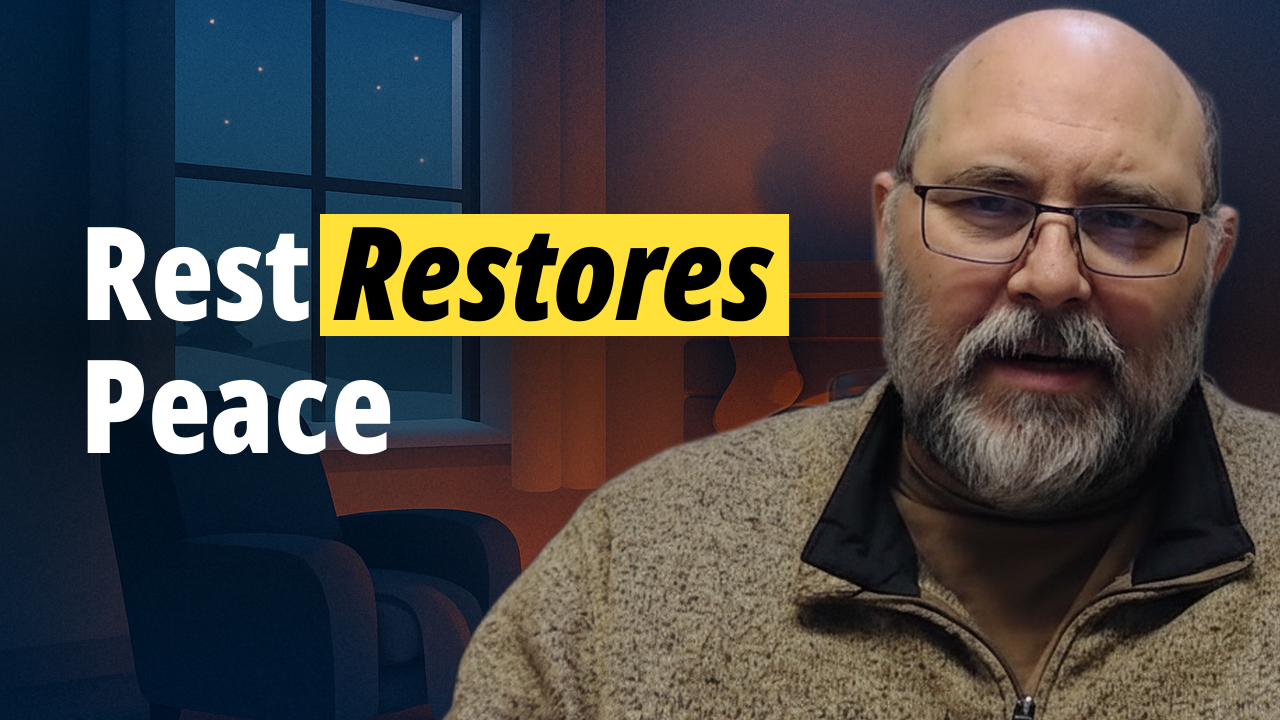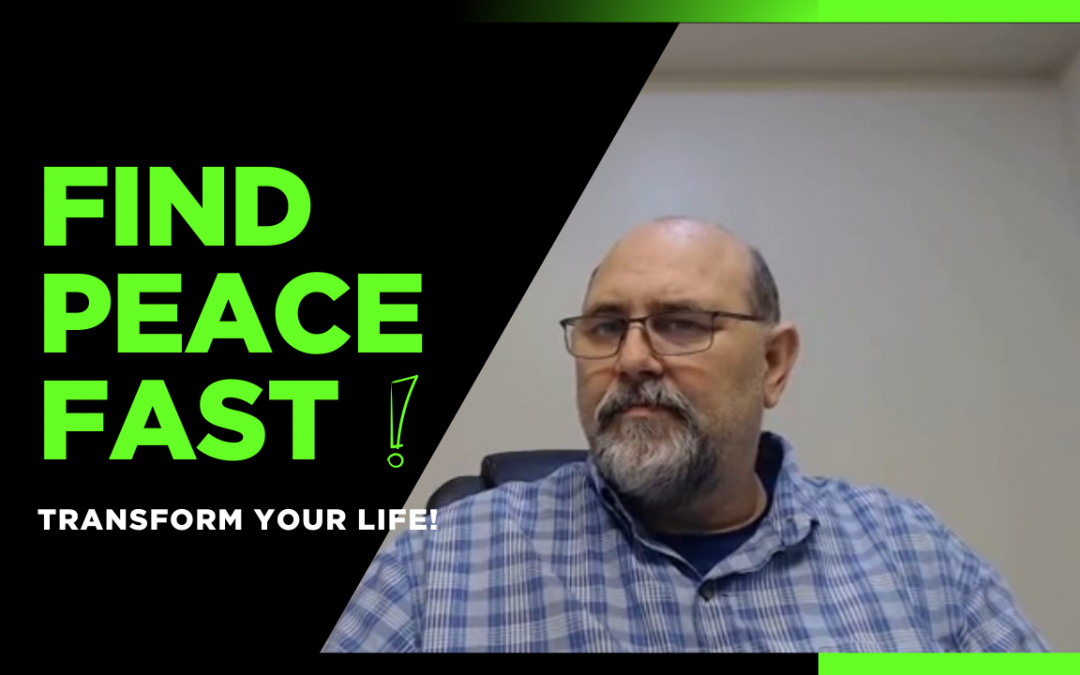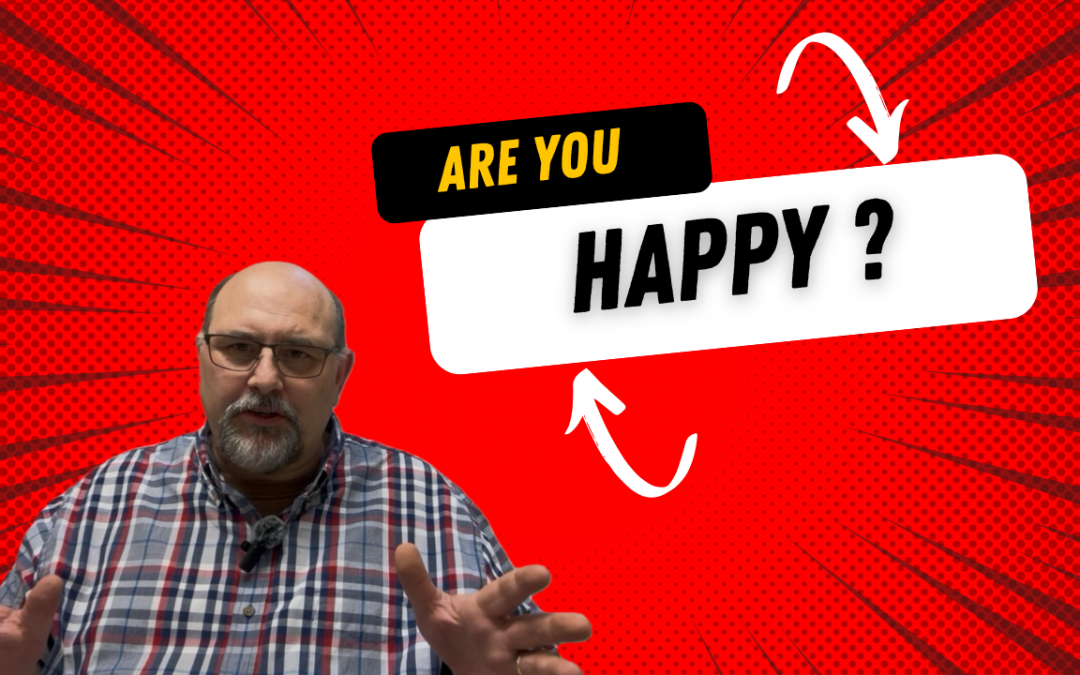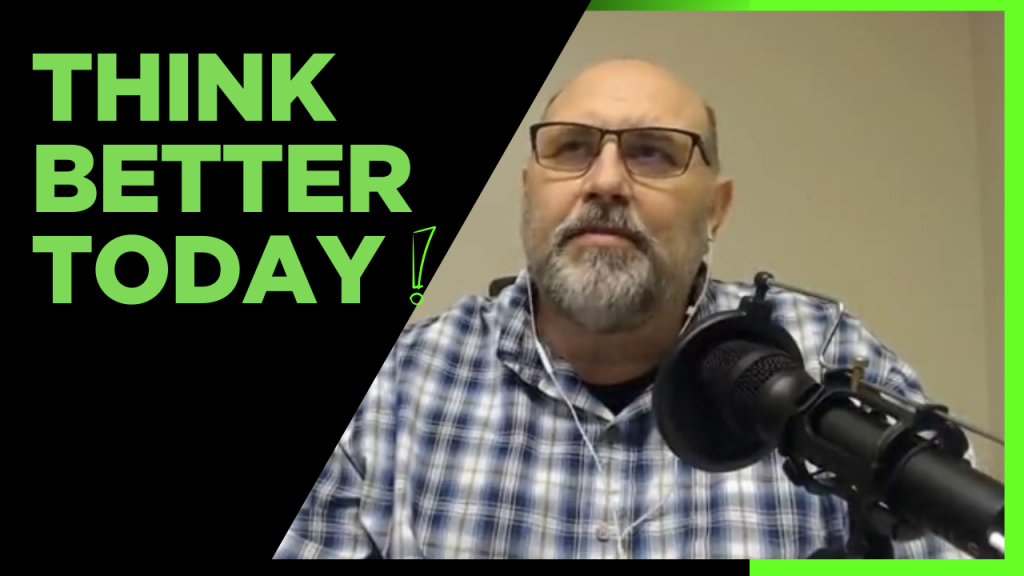Stopping at night restores peace

When was the last time you truly stopped for the night and let your mind rest. In this episode of Level Yourself Up, I speak directly to you about ending the day with intention. Christmas highlights how often nights stay noisy and rushed. Ongoing late nights weaken peace, clarity, and trust. Learning how to stop restores strength for the next day.
Stopping at night shapes how you wake up. Late meals, screens, and unfinished tasks increase mental noise and restless mornings. I share personal examples from work, home projects, and burnout to show why rest serves discipline, not reward. Rest protects focus, patience, and decision making. Trust grows when striving ends and limits receive respect.
KEY TAKEAWAYS
• Choose a nightly stop time and protect boundaries
• Prepare mornings by closing the night with intention
• Reduce screens to allow reflection and calm
• End the day with prayer and gratitude
• Treat rest as discipline, not reward
• Let unfinished work wait without guilt
• Notice stronger focus and steadier mornings
SCRIPTURE AND REFLECTION
Matthew 11 28 to 30 says, Come to Me, all you who labor and are heavy laden, and I will give you rest. Take My yoke upon You and learn from Me, for I am gentle and lowly in heart, and you will find rest for your souls.
Isaiah 40 31 says, But those who wait on the Lord shall renew their strength. They shall mount up with wings like eagles. They shall run and not be weary. They shall walk and not faint.
Psalm 46 10 says, Be still, and know that I am God.
Isaiah 26 3 says, You will keep him in perfect peace, whose mind is stayed on You, because he trusts in You.
These verses remind us that stillness, waiting, and trust restore strength and clarity.
CHALLENGES
• Choose a specific time each night to stop working
• Shut down screens at least thirty minutes before bed
• End the day with one prayer and one gratitude thought
• Let one unfinished task wait until tomorrow
• Pay attention to how your morning focus and peace change
If this episode helped you slow down and refocus, you can support the podcast by buying me a cup of coffee. Your support helps cover hosting, equipment, and time spent creating these episodes. It also allows me to keep producing content focused on clarity, growth, faith, and daily habits. You can support the show at https://buymeacoffee.com/jbudd
RELATED EPISODES
If this message on rest and clarity resonated with you, these episodes might be worth your time to listen to.
• Micro Movements That Keep You Young, Episode 111
Small daily habits that protect energy, focus, and long term well being
https://levelyourselfup.com/micro-movements-that-keep-you-young-episode-111/
• Living in Gratitude, Shifting From Fear to Faith, Episode 110
How gratitude and trust restore peace during pressure and uncertainty
https://levelyourselfup.com/living-in-gratitude-shifting-from-fear-to-faith-ep-110/
• Reclaim Your Life Through the Pause, Episode 113
Why intentional pauses create clarity, better decisions, and calmer days
https://levelyourselfup.com/ep113/
Daily Learning Snacks. Small Habits for a Sharper Mind Episode 115
In this episode of Level Yourself Up, I talk about a simple habit that strengthens your mind in ten minutes a day. I call it a daily learning snack. Learning has shaped how I think, how I solve problems, and how I grow spiritually. You do not need more time or better tools. You need a small, repeatable habit that fits into real life.
Why Daily Learning Matters
Daily learning strengthens memory, focus, and creativity. Research shows lifelong learners experience slower cognitive decline and better productivity. Learning activates brain growth factors that support neuroplasticity and mood. Writing down what you learn and teaching others improves retention up to ninety percent. God designed your brain to grow through learning and renewal.
What a Daily Learning Snack Looks Like
A daily learning snack is short, intentional learning built into your routine. You read a few pages, listen to a podcast, or watch a short talk. The goal is consistency, not volume. Ten minutes replaces mindless scrolling and resets your thinking. Over time, small learning habits compound into lasting growth.
Key Takeaways
• Spend ten minutes a day learning something useful
• Write down one idea to improve memory and clarity
• Teach or share one takeaway to increase retention
• Use podcasts, books, or short videos during routines
• Replace scrolling with learning during lunch or breaks
• Learning improves creativity, problem solving, and focus
• Scripture supports growth through renewing your mind
Scripture and Reflection
• Proverbs 1:5
A wise man will hear and increase learning,
And a man of understanding will attain wise counsel.
• Proverbs 18:15
The heart of the prudent acquires knowledge,
And the ear of the wise seeks knowledge.
• Romans 12:2
And do not be conformed to this world, but be transformed by the renewing of your mind, that you may prove what is that good and acceptable and perfect will of God.
Call to Action
Choose one daily learning snack and start today. Share what you learn on social media or in the comments. Support the podcast by subscribing, sending a message, or or buying a cup of coffee, you can do that here: https://buymeacoffee.com/jbudd Your support helps me keep producing helpful episodes and resources. Thank you for being part of this community.
Growth begins with one small habit repeated daily.
Clarity Writing, A Simple System for Better Thinking
In this episode of Level Yourself Up, I talk about clarity writing and why your writing habits shape your thinking, your emotions, and your growth. I break down three simple writing practices that guide your priorities, help you process emotions, and track your progress. Each method supports clear thinking and steady forward movement. When you build structure around your thoughts, you create space for peace and focus. My goal is to help you use writing as a tool for stability and personal development.
I walk through task methods that help you stay organized without holding everything in your head. I share emotional clarity strategies that help you respond with wisdom instead of impulse. I talk about learning logs and how writing strengthens your memory and helps you track progress. I also highlight the role of gratitude in reframing stress and anchoring your emotions. These practices support spiritual, mental, and practical growth in your daily life.
MAIN POINTS
• Write priority lists that guide your day and reduce mental clutter
• Use three task methods, top five list, full project list, one task focus
• Use emotional writing to slow reactions and create space for wisdom
• Ask simple journal prompts to process feelings and release frustration
• Track what you learn each day in a short learning log
• Write two or three gratitude items to shift your mindset
• Use Scripture to support intentional writing and personal growth
• Habakkuk 2:2
“Then the Lord answered me and said, Write the vision and make it plain on tablets, that he may run who reads it.”
• Psalm 62:8
“Trust in Him at all times, you people. Pour out your heart before Him. God is a refuge for us.”
• Proverbs 4:7
“Wisdom is the principal thing. Therefore get wisdom. And in all your getting, get understanding.”
SUPPORT THE SHOW
If you want to support Level Yourself Up, you can do that here: https://buymeacoffee.com/jbudd
Your support helps me keep producing helpful episodes and resources.
Thank you for being part of this community.
Living in Gratitude, Shifting from Fear to Faith, Episode 110
https://levelyourselfup.com/living-in-gratitude-shifting-from-fear-to-faith-ep-110/
• Micro Movements That Keep You Young, Episode 111
https://levelyourselfup.com/micro-movements-that-keep-you-young-episode-111/
• It’s Not About Perfection but Progress, Episode 112
https://levelyourselfup.com/ep112/
• Mindful Pause, Episode 113
https://levelyourselfup.com/ep113/
https://youtu.be/HeaV2WVSXQA

Mindful Pause To Reclaim Your Life
In this episode of Level Yourself Up, I talk about how a mindful pause resets your mind, your spirit, and your emotions. You deal with pressure and noise every day, and a short pause helps you shift your focus toward peace and strength. I share the breathing pattern I use, the scriptures that guide me, and the gratitude habits that keep my mornings grounded. You will hear how these tools help you respond with clarity instead of reacting in frustration. This episode gives you a simple path to reset your day with purpose.
You will learn how to recognize tension before it builds, how to slow your reactions, and how to use a mindful pause during stressful moments. I show you what to focus on, how to use breathing to calm your thoughts, and how scripture shapes a peaceful mindset. I also share a guided pause you can follow as you listen. These steps help you create space to think clearly and invite peace back into your day. If you feel stretched or overwhelmed, this episode offers a steady place to start.
MAIN TALKING POINTS
• What a mindful pause is and why it works
• How stress shows up in your day without warning
• How Philippians 4:8 and Psalms 46:10 guide your focus
• How to use a simple four count inhale and six count exhale
• How gratitude shifts your emotional state
• How to identify triggers before they create stress
• How to build your own daily pause routine
WEEKLY CHALLENGE
Take one mindful pause every day this week. Step away from the noise. Breathe in peace. Let out pressure.
REFLECTION QUESTIONS
• When do you most need a mindful pause
• What people or situations trigger stress in you
• How can you invite peace before you react
• What changes when you slow down and breathe
• What part of your day needs a pause the most
It’s Not About Perfection but Progress Episode 112
In this episode of Level Yourself Up, I talk about how striving for perfection can block your growth. I share a personal story about tiling my bathroom and how the frustration of not doing it perfectly taught me a bigger lesson about patience, humility, and progress. The goal isn’t to be flawless but to keep moving forward, even when the process feels messy.
The Lesson Behind the Tile
I started this podcast to help people focus on steady growth. This week reminded me that trying to be perfect only leads to frustration. As I worked on my bathroom tile, I caught myself comparing my work to YouTube professionals who made it look effortless. But the truth is, every skill takes time. When I let go of my unrealistic standards, the work started to flow. Progress began when I gave myself permission to fail.
Key Takeaways
-
Progress happens when you stop chasing perfection.
-
Being too critical on yourself slows your learning.
-
Comparison to others kills creativity and confidence.
-
Giving yourself grace opens space for improvement.
-
Failure teaches lessons perfection never will.
-
Self-forgiveness is a daily practice.
-
Growth requires patience and responsibility.
Weekly Reflection
Take a few moments this week to write and think through these questions:
-
Where am I being too hard on myself right now?
-
What can I do to forgive myself in that area?
-
How can I let grace and mercy guide my actions this week?
These questions help you reset your mindset and focus on what matters: consistent progress and peace of mind.
Final Thoughts
This episode is a reminder to take a step back and breathe. Ask yourself where you’re being too hard on yourself. Write down three areas where you need to let go. Then, make the choice to forgive yourself and move forward with grace. Remember, it’s not about being perfect. It’s about showing up, doing your best, and learning as you go.
Website: https://levelyourselfup.com/013-how-to-build-confidence/
TikTok: @level.yourself.up
YouTube: Level Yourself Up
00:00 Introduction to Progress Over Perfection
02:59 The Struggles of DIY and Self-Criticism
06:09 Learning from Mistakes and Embracing Growth
08:58 Encouragement to Forgive Yourself and Move Forward

Micro-Movements That Keep You Young Episode 111
In this episode of Level Yourself Up, I talk about the importance of staying active through micro-movements and daily motion. Exercise is not about long hours in the gym. It’s about staying in motion and honoring your body as a temple of the Holy Spirit. I share how small actions build energy, improve mood, and help you age with strength. You will hear what I have been learning from science, scripture, and personal experience about how to stay strong as we get older.
I explore how movement impacts focus, energy, and emotional stability. Simple habits such as walking, stretching, or doing short exercises between tasks make a difference. Science from Dr. Andrew Huberman shows that two to three minutes of movement every hour supports glucose control, clarity, and mood. I also talk about muscle loss and why maintaining strength helps prevent decline as we age. The book Younger Next Year by Chris Crowley and Dr. Henry Lodge reinforces this idea. The authors show how daily movement sends growth signals to your body while inactivity sends decay signals.
Key Takeaways
-
Your body is a temple. Caring for it is a form of stewardship.
-
Movement builds focus, balance, and independence.
-
Small bursts of activity improve metabolism and mood.
-
Muscle mass declines about one percent per year after age fifty. Strength training and protein help slow that loss.
-
You are never too old or too busy to move.
-
Micro-movements such as calf raises, shoulder rolls, or standing during phone calls build long-term strength.
-
Daily action sends growth signals to your body and supports longevity.
-
You’re never too old or too busy to move.
-
Small steps compound. Each movement is a vote for vitality.
-
Start with one thing and build momentum.
Action Step
Pick one micro-movement and repeat it every day for a week. Track your progress and note how your energy changes. Simple steps today shape your health for tomorrow.
Resources
Book: Younger Next Year by Chris Crowley and Dr. Henry Lodge – https://amzn.to/43HionV
Dr. Andrew Huberman’s research and podcast – https://www.youtube.com/@hubermanlab
EP 067 – Miracle Morning Book Reviewhttps://levelyourselfup.com/67-miracle-morning-book-review/
Discusses routines, morning habits, and mindset that support health and productivity
Bible Verses
-
1 Corinthians 6:19–20 (NIV)
“Do you not know that your bodies are temples of the Holy Spirit, who is in you, whom you have received from God? You are not your own; you were bought at a price. Therefore honor God with your bodies.”
Focus: Stewardship and honoring God through physical health. -
1 Timothy 4:8 (NIV)
“For physical training is of some value, but godliness has value for all things, holding promise for both the present life and the life to come.”
Focus: Balancing physical discipline with spiritual growth. -
Hebrews 12:11–12 (NIV)
“No discipline seems pleasant at the time, but painful. Later on, however, it produces a harvest of righteousness and peace for those who have been trained by it. Therefore strengthen your feeble arms and weak knees.”
Focus: The reward of consistent discipline and physical effort. -
Isaiah 40:31 (NIV)
“But those who hope in the Lord will renew their strength. They will soar on wings like eagles; they will run and not grow weary, they will walk and not be faint.”
Focus: Renewed strength and endurance through faith.

Living in Gratitude – Shifting from Fear to Faith Ep 110
In this episode of Level Yourself Up, I talk about how gratitude has reshaped the way I think, pray, and live. Gratitude is more than manners—it’s a mindset that transforms your outlook and draws you closer to God. I share personal stories, lessons from Scripture, and insights I’ve learned through years of practice. This episode is about finding peace in faith, even when life doesn’t go as planned.
My Reflections on Gratitude
Gratitude isn’t about ignoring problems or pretending everything is fine. It’s about trusting that God is working through every situation. 1 Thessalonians 5:18 reminds us to give thanks in all circumstances. When I live in gratitude, I find clarity and peace instead of fear and worry.
I remember being in the hospital with COVID. It was a tough time. I could have focused on fear, but instead, I prayed with gratitude—for my caregivers, my family, and the strength to heal. That shift helped me stay calm and hopeful. Philippians 4:6–7 says not to be anxious but to present our requests to God with thanksgiving. I’ve found that when I do that, peace follows.
Gratitude also affects how we see problems. When I view challenges as opportunities to grow, the solutions often appear—through people, prayer, or unexpected circumstances. Living in gratitude keeps me open, hopeful, and focused on progress instead of perfection.
What I’ve Learned from Others
Over the years, I’ve found wisdom in how others describe gratitude:
- Bob Proctor says gratitude is an alignment tool that connects us with our source.
- Tony Robbins believes gratitude changes our emotional state—you can’t feel fear or anger while being thankful.
- Jim Rohn calls it a discipline that keeps success meaningful.
These ideas remind me that gratitude isn’t passive. It’s an active decision to focus on what’s right and what’s possible.
Four Gratitude Challenges I Shared
If you want to live more gratefully this week, try these simple steps:
- Write down one thing each day that you’re grateful for that came through someone else.
- Thank God in prayer for the blessings in your life and how He’s shaping you through people and situations.
- Tell one person this week that you appreciate them, and explain why.
- Reflect in your journal on one area where gratitude could move you from being self-focused to hopeful.
These actions have helped me stay grounded and focused on God’s goodness.
Bonus: Book Review – Moving Mountains by John Eldredge https://wildatheart.org/
In this episode, I also share a quick review of Moving Mountains by John Eldredge. This book teaches how to pray with passion, confidence, and authority. Gratitude plays a central role in that process—it shifts prayer from desperation to expectancy.
What I appreciate most is how Eldredge connects prayer and gratitude as part of a deeper relationship with God. The book isn’t a quick how-to guide; it’s about aligning your heart with faith. I’ll admit it’s a little slow at times, but the lessons are meaningful. One of my favorite takeaways is this: gratitude and prayer invite God’s peace and shift us from asking to expecting confidently.
It’s a book worth reading if you want to strengthen your faith and understand how gratitude changes everything.
Key Takeaways
- Gratitude is a mindset that builds faith and peace.
- Fear and gratitude can’t live in the same heart.
- Trust God with what you can’t control, and focus on what you can.
- Journaling helps you stay thankful and aware of progress.
- Real gratitude improves relationships, leadership, and well-being.
Closing Thoughts
Each day is a new chance to practice gratitude. Thank God for what is and what will be. Tell someone you appreciate them. Keep your focus on progress, not perfection.
You can listen to this full episode and others at levelyourselfup.com/podcasts.
Follow me on TikTok: @level.yourself.up
Watch on YouTube: @levelyourself_up

What’s One Change That Would Make You Happier? Episode 109
Level Yourself Up – Episode 109: What’s One Change That Would Make You Happier?
I’m asking a simple but powerful question—what’s one change you know would make you happier, but you haven’t done it yet? I share thoughts from my own life, like finishing my basement studio, and explore how true happiness comes from inner peace and living out your values, not from chasing external rewards.
Finding Real Happiness
Happiness is more than a short-term feeling. It’s about inner contentment, peace, and purpose. Many people mistake happiness for excitement, but that fades fast. I talk about the difference between joy that comes from God and the temporary thrill of getting new things. I also share why serving others and living within your calling brings deeper satisfaction.
Living by Your Values
You’ll never be happy living by someone else’s expectations. I challenge you to reflect on what happiness means to you, what values guide your life, and what excuses you’re using to delay change. I admit my own excuses—like not recording because my studio wasn’t ready—and how I finally pushed through.
Practical Shifts for More Joy
I walk through small but meaningful changes you can make right now. Better boundaries. More rest. Daily gratitude. Less self-criticism. Even simple steps like walking outside or taking short naps can refresh your perspective and create space for growth.
Faith and Mindset
Faith plays a key role in how I define happiness. I believe true joy comes from God’s presence within us. I also touch on how our thoughts and words shape our emotions. Speaking gratitude and affirming your growth helps rewire how you see yourself.
Episode Takeaways
- Ask yourself what single change would make you happier.
- Define happiness based on your values, not others’ opinions.
- Serve others—it’s the surest path to fulfillment.
- Let go of excuses that delay your growth.
- Set boundaries and prioritize rest.
- Speak gratitude and life into your daily mindset.
- Re-evaluate your habits and make room for joy.
Listen Now
Stream this episode and past ones on Level Yourself Up:
https://levelyourselfup.com/podcasts/
Connect with me on:
TikTok: https://www.tiktok.com/@level.yourself.up
YouTube: https://www.youtube.com/@levelyourself_up
Past podcast worth looking at https://levelyourselfup.com/de-clutter-and-finding-peace/

Rethinking Failure: The Path to Success
Welcome to Level Yourself Up, where we focus on progress over perfection. In this episode, I talk about the concept of failure and how it affects our mindset. Too often, we let failure drag us down, convincing ourselves that setbacks define us. But what if we changed our perspective? Instead of seeing failure as a roadblock, we can reframe it as a stepping stone toward success. I’ll share personal insights, biblical wisdom, and real-world examples of how embracing failure can unlock your potential.
Failure is often misunderstood. Many people see it as an end, but it’s actually a powerful learning experience. I’ve faced my own struggles—even getting this podcast out wasn’t easy. Like any challenge in life or business, failure isn’t a signal to quit but an opportunity to grow. Learning new skills, adapting, and persevering are key to overcoming obstacles. In this episode, I discuss the importance of pushing through challenges and how influential figures like Michael Jordan and Elon Musk used failure to fuel their success. I also explore the role of faith and how trusting in God can provide strength during difficult times.
Key Takeaways from This Episode
- Failure is not final – It’s a stepping stone, not a dead end.
- Learned helplessness holds us back – We must challenge the mindset that we are powerless to change.
- Faith plays a role in resilience – Biblical wisdom reminds us that God strengthens us through trials (1 Peter 5:10, Psalm 145:13-14).
- Failure is data, not defeat – Remove emotion from setbacks and analyze the facts to make better decisions.
- Even the greatest fail – Michael Jordan missed thousands of shots, but his mindset made him a legend.
- Surround yourself with support – A coach, mentor, or trusted friend can help you navigate challenges.
- Keep learning and growing – If you’re not learning, you’re stagnating. Growth comes from perseverance.
Final Thoughts
Failure isn’t something to fear—it’s something to embrace. The most successful people in history have failed more times than we can count, but they didn’t let it stop them. Instead, they used it to refine their skills, shift their strategies, and ultimately achieve greatness. I encourage you to rethink failure in your own life. How can you use setbacks as stepping stones? What lesson can you take from today’s challenges? Let’s push forward together and Level Yourself Up!


